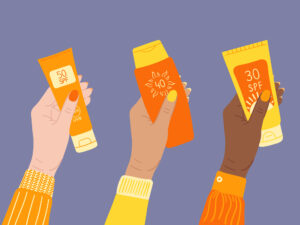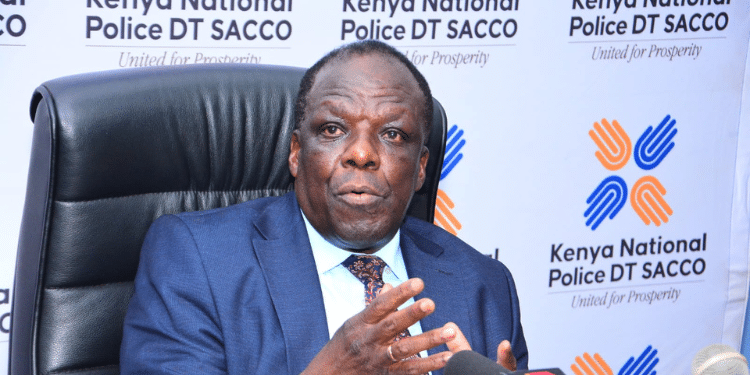Sunscreen is important as it helps in protecting the skin from ultraviolet (UV) rays. UV rays can cause damage to the skin, including sunburn, premature aging, and an increased risk of skin cancer.
When you apply sunscreen, it absorbs or reflects the UV rays hence preventing them from reaching and harming your skin.
As we move away from the myth that sunscreen is for specific skin types, let us also learn that sunscreen should be applied to all exposed skin, and not just the face and arms. In that same aspect, it is important to apply sunscreen throughout the year and not just during the summer or when spending time at the beach.
Furthermore, sunscreen recommendations may vary depending on an individual’s skin type and sensitivity. For instance, people with sensitive skin may need to use a sunscreen specifically formulated for sensitive skin, while those with oily skin may need to use a non-greasy, oil-free sunscreen.
As such, you are required to consult a dermatologist to understand your skin and clear any doubts you may have on the type of sunscreen to use.
Moving Away from the Myth; Some Skin Types Do Not Need Sunscreen
For ages people have shared the notion that only light or pale skinned people require sunscreen to protect their skin from sunburn and any other sort of sun damage. This is not true, as all skin types need sunscreen to protect them from harmful sun rays.
Moreover, people with darker skin types are more likely to have the added problem of discoloration or melasma (uneven skin tone). Exposure to the harmful sunrays can worsen this condition. Darker skin types need the same UVA and UVB protection just as lighter skin types do.
Even though dark skin offers more natural protection from the sun’s harmful rays than the light skin, no one is immune to the damage caused by harmful sun rays. As such it is time, we move away from the misconception that people with dark skin complexion do not require sunscreen.
People with dark skins naturally produce more of melanin, which gives the skin its color and absorbs the sun’s damaging ultraviolet (UV) rays. Dark-skinned people have a natural skin protection factor (SPF) of up to 13, and filter twice as much UV radiation as fair or light-skinned people. However, this does not guarantee them immunity to skin conditions caused by harmful sun rays. People with dark skins will not get sunburned as quickly, but they will still burn, and they are susceptible to sun-induced damage, including sunspots, wrinkles, and even cancer in worst case scenarios.

Furthermore, health experts recommend that everyone should apply sunscreen with an SPF of at least 30 on their skin regardless of the skin color. A study revealed that dark-skinned people are more likely to die from skin cancer than light-skinned people.
Moreover, the lead author of the study highlighted that the commonly held belief that people with darker skin will not get sunburned or get skin cancer gives such people a false sense of security. They are less likely to take preventative measures, such as applying sunscreen on their skin, as well as routinely going for checkup on the signs of skin cancer. Due to the neglect, when people with dark skins are diagnosed with skin cancer, the disease may be in advanced stages and more difficult to treat.
You may find few dark-skinned people with skin cancer as compared to light-skinned individuals, but the death rate for dark-skinned people with skin cancer is higher than that for light-skinned people (who technically are at greater risk of developing skin cancer).
Also Read: Bouncing Back After Overeating During the Festivities
The Kenya Times got the chance to interact with a few individuals to gather their views on using sunscreen and whether they consider it an important aspect of skin care or not. The responses were diverse with some stressing on how much sunscreen has protected their skins, some saying they do not really need it and some totally against its use.
Mr. Franklin says he wears sunscreen only when visiting areas known for high temperatures like the coastal region in Kenya and during summer when he is out of the country. Franklin states that he began using sunscreen after he got serious sunburns during his vacation at the coast.
He further explains that he grew up in places where temperatures were not too high and did not see the need for sunscreen but came to appreciate its value when he experienced summer while out of the country
“Sunscreen is important because it offers UV protection. If you have experienced the European summer, it goes up to almost 37 degrees. You walk in that; your skin is toast,” he added.
Miss Maureen, a resident of Nairobi, shares her sunscreen journey, noting how much it has protected her skin from ultraviolet rays.
“Yes I do use sunscreen. I started using it once I got aware it exists when I was in primary school.”
Maureen is a person with Albinism and has been using sunscreen for as long as she can remember. She says it is very important for her and any other person with less melanin as it protects the skin from sun damage and skin cancer.
On the contrary, there were a few people against the use of sunscreen. Some of them based their reasons on bad experiences with some sunscreen brands like having rashes or burning sensation whereas some had no idea of what sunscreen is and why they need it.
Mr. Martin from Kiambu says he used some sunscreen in the past and had an allergic reaction to the product. He further explains that he experienced skin irritation, itching and swelling. As such he vowed to never try any sunscreen product.
Miss Aurelia on the other hand noted that she uses sunscreen occasionally whereas Mr. Brills, a resident of Mombasa County, had no clue what sunscreen is and why he needed to wear it.

Also Read: Inclusive Education and Employment for PWDs
Conclusively, from the people The Kenya Times got the opportunity to engage on the importance of wearing sunscreen, it is clear that a large number do not see the need to protect their skins from sunburn. An average number use it occasionally and very few actually use it daily or more often.
As a result, there is need for awareness on the importance of wearing sunscreen and the harmful effects of ultraviolet rays to our skin.
Consequently, all skin types are delicate and require protection from ultraviolet rays. Wearing sunscreen recommended by a dermatologist will go a long way in protecting your skin from the harmful sunrays. The sunburn may not show so much for dark-skinned people, but this does not make it harmless. That routine skin checkup, use of sunscreen and creating awareness on the importance of sunscreen to all skin types may just save a life.









































































